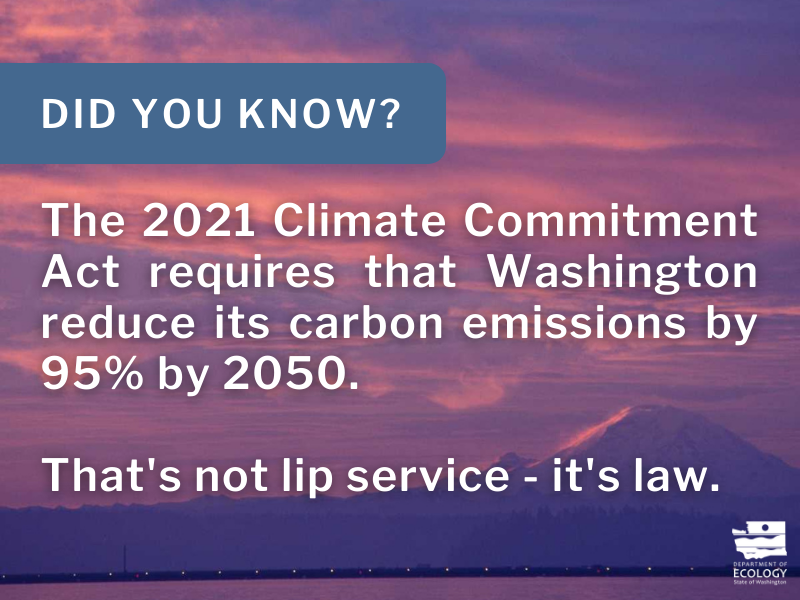
The CCA is moving us toward our shared low-carbon future
In 2021, the Washington Legislature passed the Climate Commitment Act, a sweeping bill that directs Ecology to develop and implement a statewide cap-and-invest program to cut carbon pollution.
A cutting-edge tool in the fight against climate change, Washington is only the second state to implement such a program. The Climate Commitment Act, or CCA, is a market-based program — meaning that the law sets standards, but leaves it up to businesses to find the most efficient method to achieve those requirements. The law sets a limit on overall carbon emissions in the state and requires emitters to obtain ‘emissions allowances’ equal to their covered greenhouse gas emissions.
These allowances can be obtained through quarterly auctions hosted by Ecology, or bought and sold on a secondary market (just like stocks and bonds). In some specific cases, emitters may receive no cost allowances directly from Ecology, but most emitters will need to purchase their allowances — meaning that reducing emissions becomes a benefit to their bottom line.
A commitment to change
The CCA outlines the emissions-reduction targets the state must meet in the coming decades — and meeting these targets isn’t optional, they’re legal limits set in state law. Using 1990 emissions levels as the baseline, Washington is required to reduce its emissions by 45% by 2030, by 70% by 2040, and by 95% by 2050. What’s more, we’re required to offset that remaining 5% using carbon reduction, removal, or avoidance projects, making the state fully carbon-neutral in just 37 years.
Making air quality everyone’s business
In order to ensure we meet those limits, Ecology will set an ‘emissions cap’ for all greenhouse gas emissions covered under the CCA (some emissions sources are not covered, about 25%). That cap will be reduced incrementally each year to keep us on track to meet the 2030, 2040, and 2050 targets, which means that we will issue fewer and fewer emissions allowances.
This incremental ‘cap’ reduction means businesses will also be incentivized to decarbonize through the power of supply-and-demand.
As allowances become more scarce, they will become more valuable (that’s supply-and-demand at work!). Businesses that do not sufficiently reduce their emissions will be faced with increasing compliance costs and, potentially, the inability to obtain enough allowances to cover their emissions.
If a business doesn't obtain enough allowances, or otherwise fails to comply with the law, it can face stiff penalties.
Centering justice
Beyond incentivizing business to reduce emissions, the CCA also works to make sure that cutting carbon pollution produces health and economic benefits for the communities that bear the brunt of air pollution today. That approach puts environmental justice at the heart of the law, and seeks to alleviate the effects of greenhouse gas emissions and other types of air pollution in ‘overburdened communities.’
Some of the revenue generated by the emissions allowance auctions (anticipated to be about $500 million per year) will be earmarked specifically for projects and programs designed to address air quality issues in these communities and to advance health and environmental equity statewide. In addition, the CCA requires that at least 35% (with a goal of 40%) of total auction proceeds be dedicated to projects that benefit vulnerable populations within overburdened communities in Washington. In addition, at least 10% of auction funds must be allocated toTribal projects (RCW 70A.65.230).
Track our progress
Statewide decarbonization can’t wait any longer, which is why the CCA directs Ecology to develop and fully implement the cap-and-invest program by January 2023. That’s a tight timeline for a big project, but our CCA Implementation Group is hard at work putting all the pieces together. If you’d like to join us in this exciting, meaningful work, we’re hiring! Check out our current job openings or sign up for our CCA Jobs email list.
In the meantime, we’ll be putting out monthly progress reports, here on the Ecology blog, to keep you updated on important developments. For now, we’re in rulemaking on some of the biggest aspects of this program, and you can find out more about what we’re working on and where we are in the process by checking out the Chapter 173-441, Chapter 173-446, and Chapter 173-446A webpages. You can also sign up for rulemaking-specific alerts on each page, or sign up for all CCA-related updates by registering for our email list.

